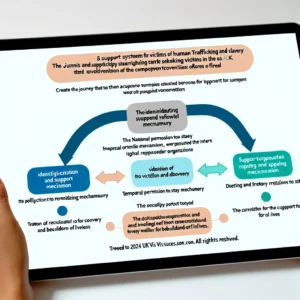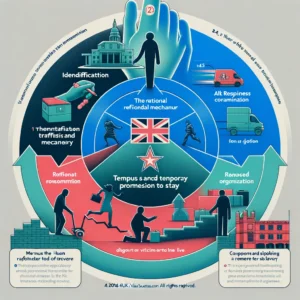A Guide for Victims of Human Trafficking and Slavery
This article fully explores the UK immigration route for Victims of Human Trafficking and Slavery and is divided into three parts for easier navigation. This section is part one. You can continue reading with part two HERE and part three HERE.
If you find yourself or someone you know in the unfortunate position of being a victim of human trafficking or slavery, understanding your rights and the options available to you in the UK is crucial. This guide aims to shed light on the process of obtaining temporary permission to stay (VTS) in the country, specifically designed to support those identified as victims through the National Referral Mechanism (NRM, explained below).
Understanding Temporary Permission to Stay (VTS)

Temporary Permission to Stay is a lifeline for confirmed victims of human trafficking and modern slavery. The term ‘modern slavery’ encompasses human trafficking, slavery, servitude, and forced or compulsory labour. This status provides you with legal permission to remain in the UK for a temporary period, offering protection and an opportunity to begin rebuilding your life away from the dangers of slavery.
Eligibility and Application Process
For eligibility, your victim status needs confirmation through the National referral mechanism, a government framework aimed at identifying and supporting victims. Once identified, the process for applying for VTS involves several considerations.
Key Considerations
When considering granting VTS, a few critical aspects come into play. The well-being of you and any dependent children is a primary concern. The decision-making process will take into account the need for protection, the possibility of extending your stay, and under certain circumstances, the cancellation of the permission to stay. The aim is to ensure that you receive the support and protection needed during this challenging time.
Extensions and Cancellations
In some cases, an extension of your temporary stay might be necessary. Strict regulations govern extension criteria, ensuring only those genuinely needing more time in the UK receive it. Conversely, there might be instances where permission to stay is cancelled, although this is rare and subject to specific conditions.
The Role of the National Referral Mechanism (NRM)
The NRM stands as the pivotal framework for the referral and identification of potential victims of modern slavery. Its primary aim is to ensure that victims receive the necessary support to recover from the exploitation they have endured. This support is facilitated through First Responder Organisations, which include police forces, the National Crime Agency, local authorities, and health and social care trusts, among others. These organisations have the authority to make referrals into the NRM, providing a structured pathway for victims to receive the help they need.
First Responder Organisations and Their Duties
Specific public authorities carry the responsibility, under section 52 of the Modern Slavery Act 2015 , to notify the Secretary of State about individuals in England and Wales suspected of being modern slavery victims. This duty ensures that potential victims are identified and referred for further assessment.
Deciding Authorities: The Competent Authorities
The Competent Authorities, which include the Single Competent Authority (SCA) and the Immigration Enforcement Competent Authority (IECA), have the crucial responsibility of determining an individual’s victim status. Trained specialists in these bodies assess whether reasonable and conclusive grounds exist to identify someone as a victim of modern slavery.
The Evaluation Process
The determination process involves two key stages:
- Reasonable Grounds Stage: The initial assessment aims to establish if there are reasonable grounds to believe an individual is a potential victim of modern slavery.
- Conclusive Grounds Stage: If the assessment indicates potential victim status, a further evaluation determines whether conclusive grounds exist to confirm the individual as a victim of modern slavery.
After confirming victim status with a positive conclusive grounds decision, the process then considers individuals without UK immigration status for temporary permission to stay. This crucial step is to recognise the importance of offering victims a foundation for starting their recovery journey in a safe environment, away from the threats that once dominated their lives.
Collaborating with Public Authorities
If you’re identified as a victim of modern slavery and choose to assist in investigations or criminal proceedings in the UK, you may have the opportunity to apply for permission to stay or extend your current stay on this basis. It’s crucial for you to cooperate fully with public authorities, be it the police or any legal body involved in the prosecution of your case.
This cooperation is a cornerstone for potentially securing leave to remain in the UK during the investigation or trial. Your presence in the UK must be necessary for the case, precluding remote methods like video hearings.
To support your application, include thorough investigation details: public authority name, officer contacts, and relevant information aiding Home Office liaison. This effort is to ensure that your involvement is duly recognised and considered in your request for temporary permission to stay.
Transitioning Towards Recovery

The journey from identifying victims to offering support and possibly granting temporary stay underscores the UK’s dedication to fighting modern slavery. It highlights the need for a coordinated approach prioritising victims’ well-being, ensuring they receive necessary support for rebuilding.
Supporting Child Victims of Modern Slavery: A UK Perspective
The UK tackles the serious issue of modern slavery by focusing on protecting the most vulnerable, especially children. This priority aligns with the Nationality and Borders Act 2022, Immigration Rules, and the 2009 Borders, Citizenship and Immigration Act principles.
Safeguarding Children’s Welfare
The safeguarding and welfare of children in the UK stand as a paramount concern. Section 55 of the Borders, Citizenship, and Immigration Act 2009 emphasises the importance of prioritising the well-being and interests of children in all immigration matters. This law mandates prioritising children’s best interests in decision-making, although it doesn’t disregard other factors.
Section 55: Ensuring Children’s Welfare
It’s crucial to follow the guidelines set out in Section 55. These apply to cases with children or families. The Home Office offers “Every child matters: statutory guidance.” This guidance sets key principles. It ensures fair treatment for every child. Discrimination is avoided. Applications are processed quickly. This way, all children receive care akin to that expected by British children.
Considerations and Evidence
Reviewing applications from child victims of modern slavery requires carefully going over all the information and evidence provided. The decisions should clearly show a thorough consideration of how the outcome could affect the child’s situation in the UK. It’s essential to:
- Put the child’s interests first, while understanding they’re not the only consideration.
- Steer clear of discrimination in any form.
- Process applications swiftly, avoiding unnecessary delays.
- Spot any potential risks that could harm the child.
Decision-making Process
When making decisions, the decision-makers understand that showing that they’ve carefully considered what’s best for the child is crucial. This requires checking if the child’s home country or another safe country can meet their needs. The UKVI should weigh evidence from reliable and well-known sources more heavily than unverified claims about the child’s welfare.
Evidence Assessment
Assessing the quality of evidence plays a crucial role in the decision-making process. The Home Office prioritises verifiable documents, ensuring that decisions rest on solid and trustworthy information. This approach puts the child’s best interests first. It shows the UK’s strong commitment to protect and support child victims of modern slavery. It ensures their safety and well-being remain central to immigration considerations.
